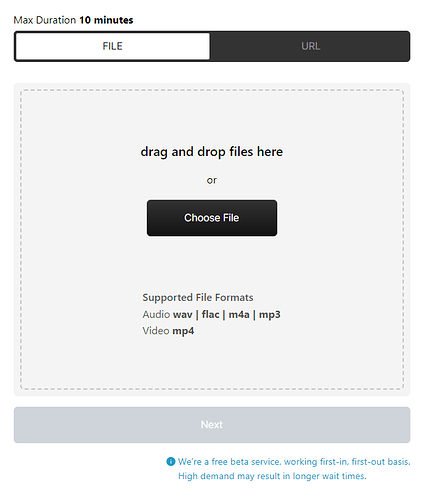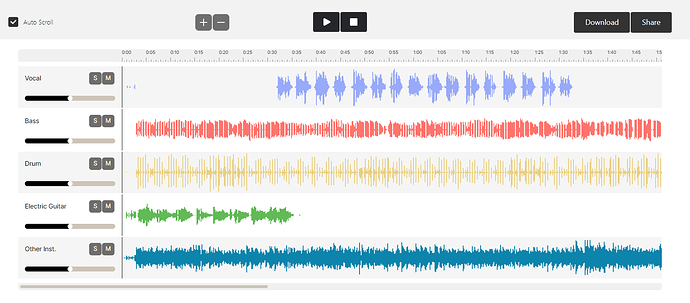Works well and is free. Not sure what Moises offers over and above this?
Sounds like it might not be free for ever “We are a free beta service…”
True, though I often see these types of projects run for a very long time. Looking at the Wayback Machine, it appears this page has been around since 2022, though I can’t say in what form.
Regardless, it is free today if folks were looking for an easy, free, web-enabled service to do stem separation.
I’ve been using Moises since the beginning of the year, when I started doing my covers. Overall, it works, although as others have said, it can be a bit hit and miss on some tracks. For example, while I have done a cover of Duran2’s Wild Boys, the backing sucks as Moises didn’t seem to be able to cope with Nick Rhodes synth parts and some of the drum parts. Equally, some ‘live’ tracks that I have tried to split haven’t sounded that good and have either be only just usable (example, Wild Thing) and completely unusable (a live version of the Duran2 song, Do You Believe in Shame). For the most part, though, they the tracks I use are good enough.
What I do like about Moises, and what keeps me using it, is the phone app. I use every day for practice, running my iPhone into a ZoomB1 four, cancelling out the bass track and then paying over the top. This is how I now play most of the time. For the rest of the house, it’s quiet, but I get to hear what I am doing, in context.
Removing the bass is the opposite of my usage but RipX has serious potential for song analysis. Might buy it.
Yeah, it has a ton of features over and above stem separation. I’ve only scratched the surface with it, but it’s pretty cool. Which Hook bass line were you having trouble with? My curiosity has the better of me and I’m wondering if it can be manually nudged in the right direction.
Sunrise. I haven’t tried reassigning the line to the bass track yet. It’s currently got basically mud in the bass track.
There’s a note on the site that it will “upgraded” on May 9th. I wonder if that is code for the end of the free beta.
I tried to upload 2 different tracks (1 mp3 and 1 wav) and both just gave me a “fail” message with no reason… moises had previously worked for both. Maybe I’ll keep an eye on it tho…
Ugh, yeah, the bass line gets put in the guitar stem. I zoomed out all the way and grabbed all of the notes in the approximate range of his bass and cut/paste them into a new layer/stem. It’s not perfect, but gets in the vicinity. Tedious work to get it perfect.
Side note, I’ve found the “Purify” effect to be helpful in making the ripped content sound more natural after being extracted from the mix.
It does look like the beta is ending. Dang. Will watch to see what happens when the new service is launched.
I tried some open source app : stemroller (found on github)
And it worked really well for me when I tried to isolate bass for Imperium (Machine Head)
You can just install it locally.
Hey @inscr welcome to the forum!
I just checked that out and it was pretty cool. Works really well! The documentation warns that it might be slow, but OMG, this was the fastest stem splitter I’ve ever seen.
I took the lazy way out and grabbed the installer from their website: https://www.stemroller.com/
Seriously, I need to run that test again, it was unbelievably fast! And good quality.
Thanks for this. Love that it runs locally and that it finds the song for you… I don’t know much about the models, but it’s based on demucs which I don’t think is being updated anymore, which is a little disappointing, but maybe I’m wrong…
Have you compared it to RipX (non-pro), in terms of quality?
I haven’t, but if you’d like to compare, here is the same song file split into stems by both of them:
Interestingly, RipX took 1:25 to process this (save stems only was checked), and StemSplitter took 0:23.
As sensitive as you are to it, you’d be a better judge of audio quality between the two.
Will test it with a hires FLAC, like “Nothing Else Matter” by Metallica.
It has a great & distinctive bass line and the recording is top notch.
Stay tuned for results.
I don’t think absolute fidelity is necessary here as the processing to separate the stems will alter the track balance; playing all the separate stems together will not be the same as the original mix regardless.
I think what you should be more interested in is if it accurately separates the bass more often with one method vs the other.
I don’t use the stems anyway.
What I do is the following - I make three tracks:
- bass removed - for final cover production. Here I really prefer great quality, as the final mix will sound like sh#t otherwise…
- bass removed with loud drums (instead of metronome) - for recording the cover.
- bass a little louder and loud drums (instead of metronome) - for initial practicing. I use this to actual understand what’s actually happening , bass-wise.
For this test I will compare the bass stem too (this is what you wanted, right?). Sometimes the individual stems sound, sh#t especially for higly processed stuff.
With Moises at least this is not the case, stem levels are not altered (or normalized) so when I download the stems and load into Logic playing back all stems gives the original mix
Stem extraction will never be perfect due to things like masking…I have found when mixing down a cover that mixing from a full set of stems and just muting the bass stem (and adding my bass) is fine, but I get the logic of your method to minimize the amount of processing to limit errors (and admire that you care enough to do three extractions each time you learn a song)
Don’t admire me. Analyzing the song takes most time - but that’s RipX, not me ![]()
After that it’s just a matter of muting or changing the level of a stem and save the tracks.
That’s a few seconds and no effort at all (in RipX).



